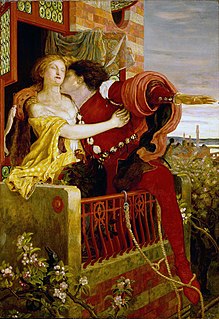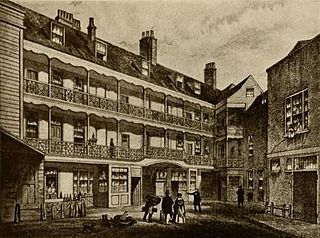
Romeo and Juliet is a tragedy written by William Shakespeare early in his career about two young Italian star-crossed lovers whose deaths ultimately reconcile their feuding families. It was among Shakespeare's most popular plays during his lifetime and, along with Hamlet, is one of his most frequently performed plays. Today, the title characters are regarded as archetypal young lovers.

Shakespeare in Love is a 1998 romantic period comedy-drama film directed by John Madden, written by Marc Norman and playwright Tom Stoppard, and produced by Harvey Weinstein. It stars Gwyneth Paltrow, Joseph Fiennes, Geoffrey Rush, Colin Firth, Ben Affleck and Judi Dench.

William Kempe, commonly referred to as Will Kemp, was an English actor and dancer specialising in comic roles and best known for having been one of the original players in early dramas by William Shakespeare. Roles associated with his name may include the great comic creation, Falstaff, and his contemporaries considered him the successor to the great clown of the previous generation, Richard Tarlton.

William Shakespeare's Romeo and Juliet is a 1996 American romantic crime tragedy film directed, co-produced, and co-written by Baz Luhrmann, co-produced by Gabriella Martinelli, and co-written by Craig Pearce. It is an adaptation and modernization of William Shakespeare's tragedy Romeo and Juliet. The film stars Leonardo DiCaprio and Claire Danes in the title roles of two teenagers who fall in love, despite their being members of feuding families. Brian Dennehy, John Leguizamo, Harold Perrineau, Pete Postlethwaite, Paul Sorvino and Diane Venora also star in supporting roles.
This article contains information about the literary events and publications of 1597.

Sir John Oldcastle is an Elizabethan play about John Oldcastle, a controversial 14th-/15th-century rebel and Lollard who was seen by some of Shakespeare's contemporaries as a proto-Protestant martyr.

The Curtain Theatre was an Elizabethan playhouse located in Hewett Street, Shoreditch, just outside the City of London. It opened in 1577, and continued staging plays until 1624.
The Lord Chamberlain's Men was a company of actors, or a "playing company", for which Shakespeare wrote during most of his career. Richard Burbage played most of the lead roles, including Hamlet, Othello, King Lear, and Macbeth. Formed at the end of a period of flux in the theatrical world of London, it had become, by 1603, one of the two leading companies of the city and was subsequently patronized by James I.

Tybalt is a character in William Shakespeare's play Romeo and Juliet. He is the son of Lady Capulet's brother, Juliet's short-tempered first cousin, and Romeo's rival. Tybalt shares the same name as the character Tibert/Tybalt the "Prince of Cats" in Reynard the Fox, a point of mockery in the play. Mercutio repeatedly calls Tybalt "Prince of Cats". Luigi da Porto adapted the story as Giulietta e Romeo and included it in his Historia novellamente ritrovata di due Nobili Amanti published in 1530. Da Porto drew on Pyramus and Thisbe and Giovanni Boccaccio's Decameron. Da Porto gave it much of its modern form, including the lovers' names, the rival families of Montecchi and Capuleti, and the location in Verona. He also introduces characters corresponding to Shakespeare's Mercutio, Tybalt, and Paris. Da Porto presents his tale as historically true and claims it took place in the days of Bartolomeo II della Scala. Montague and Capulet were actual 13th-century political factions, but the only connection between them is a mention in Dante's Purgatorio as an example of civil dissension.

Mercutio is a fictional character in William Shakespeare's 1597 tragedy, Romeo and Juliet. He is a close friend to Romeo and a blood relative to Prince Escalus and Count Paris. As such, Mercutio is one of the named characters in the play with the ability to mingle around those of both houses. The invitation to Lord Capulet's party states that he has a brother named Valentine.

Shakespeare's plays are a canon of approximately 39 dramatic works written by English poet, playwright, and actor William Shakespeare. The exact number of plays—as well as their classifications as tragedy, history, or comedy—is a matter of scholarly debate. Shakespeare's plays are widely regarded as being among the greatest in the English language and are continually performed around the world. The plays have been translated into every major living language.
Lord Strange's Men was an Elizabethan playing company, comprising retainers of the household of Ferdinando Stanley, Lord Strange. They are best known in their final phase of activity in the late 1580s and early 1590s. After 25 September 1593, they were known as the Earl of Derby's Men, that being the date of Stanley's accession to his father's title.
Augustine Phillips was an Elizabethan actor who performed in troupes with Edward Alleyn and William Shakespeare. He was one of the first generation of English actors to achieve wealth and a degree of social status by means of his trade.

Thousands of performances of William Shakespeare's plays have been staged since the end of the 16th century. While Shakespeare was alive, many of his greatest plays were performed by the Lord Chamberlain's Men and King's Men acting companies at the Globe and Blackfriars Theatres. Among the actors of these original performances were Richard Burbage, Richard Cowley, and William Kempe.

In the historical era of English Renaissance drama, an Inn-yard theatre or Inn-theatre was a common inn with an inner courtyard with balconies that provided a venue for the presentation of stage plays.

The Shakespeare Stealer is a 1998 historical fiction novel by Gary Blackwood. Taking place in the Elizabethan-era England, it recounts the story of Widge, an orphan whose master sends him to steal Hamlet from The Lord Chamberlain's Men. It was an ALA Notable Children's Book in 1999. Blackwood published two sequels, Shakespeare's Scribe (2000) and Shakespeare's Spy (2003).
John Sinklo was an English Renaissance theatre actor, known to be active between 1592 and 1604. He was a member of several playing companies, including Lord Strange's Men, Pembroke's Men, Lord Chamberlain's Men and the King's Men. It is likely that Sinklo also performed with Sussex's Men, following the text of Titus Andronicus which Sussex's inherited from Pembroke's.

Róbert Alföldi is a Hungarian actor, director and television host. He was the director of the Hungarian National Theater for five years from 1 July 2008 until 2013.












